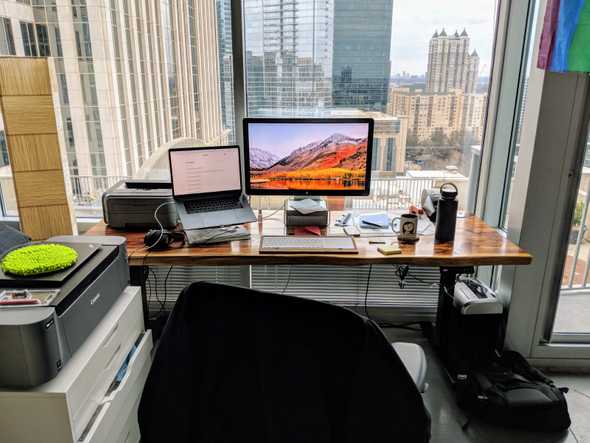Four Quick Tips for Remote Work Newbies
For a long-time I really believed remote work was the absolute panacea for all work-related problems, but it has risks of its own. Don’t get tripped up by the simple stuff.
Remote work typically means that you have much more control over your creature comforts which is a blessing and a curse. You get to have the workspace be the exact temperature you want, as quiet as you want, and the kitchen is stocked with exactly your favorite foodstuffs. Conversely, your favorite distractions are immediately available to compete with your commitment to work. It’s still possible to live the work from home dream with a little planning.
When you work remotely you have to make a conscious decision to create a space that is only for work.

It’ll be the single greatest boon to your productivity. Buy a good desk and a really good chair. Clear all the other junk away from the area. That space is for you to work. You can even tape off the space on the floor if you need to.
Like everything else work needs to be a habit. You can have your own routine, but you should still set a schedule.
Even when I work from home I still start my day with making my bed, taking a shower, and getting dressed. It is a small thing, but it sets the mindset that it is time to go do things. Schedules are also important because often other people depend on you. You can set boundaries when you have a schedule. Set working hours and for your own sanity stick with them. Simply because you can work whenever is not a reason to always work. It is after 8pm, use discipline, respond to that email tomorrow.
Shared calendars are great for managing irregular (read: personally designed) schedules. Blocking out when you are going to be working means making the right tradeoffs with your other priorities: family, friends, networking, and drag shows. Use a calendar and share it with your team. Be vulnerable and make the sharing public by default. It is important for coworkers to know if they are scheduling over your daughters recital or somebody’s status meeting.
Working from home is sometimes lonely. You will have to learn to plan social time — both personal and professional.
My favorite personal plans are board game night, seeing a movie with a friend, or cooking for people. My friends can tell if I am currently working from home or an office. When you socialize at the office you may tend to go home and socialize less. When you work at home you get cabin fever pretty quick. Your friends working in offices may not want to go out as badly during the week — it doesn’t mean they like you any less. Find additional structured social fun — volunteering with charities, intramural sports clubs, book clubs, etc.
Meet ups, conferences, (some) co-working spaces, and coffee shops are great ways to still have a little professional socialization. In my humble opinion the coolest co-working spaces are still very work oriented, but professionally social — providing opportunities to help one another or even pair program. Avoid the ones that are drinking clubs. It is important, especially if you are not working much on a team to keep those communication skills sharp. Practicing how to communicate about your work (and its value) is as important as your work. That comes with practice like everything else.
Don’t treat colocated work as the enemy. There are a lot of opportunities for better remote interactions when you’ve had face to face interactions.
You can learn the cadence, tenor, and voice of the people you are working with. This matters because communication becomes easier. Ever see two old friends communicate in a short-hand that is almost unintelligible? I try to insist on 3–5 days of colocated work for project kickoffs, especially when the remote people haven’t actually met everyone. You quickly can pick up a communication shorthand and avoid potential points of confusion in a conversation much more quickly than online. You discern their diction, how much they know about a topic, how much they’ve had to communicate about their work. What their triggers may be. Mostly I find that having some face-to-face time helps me read all future communication in the cadence, voice, and intent of the person that wrote it.